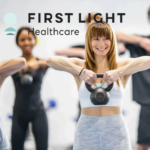HEALTHY EATING QUESTIONS AND ANSWERS
This week is National Nutrition Week (October 15 – 20) Nutrition Australia’s annual push to get Aussies eating more of the good stuff and less of the junk.
As part of National Nutrition Week, each year Nutrition Australia promotes its Tryfor5 campaign where Australians are encouraged to increase their vegetable intake.
Our dietitian Gabriela Negrao gives us the lowdown on how to start improving our diets… and it’s easier than you think.
HOW MANY VEGETABLES SHOULD I BE EATING?
Nutrition Australia says five serves of veggies a day is best for optimum health.
Doesn’t seem like much, but you may be surprised to know that 96% of Australians are not eating their recommended daily serve of veggies.
And most of us aren’t evening coming close, with the average Aussie eating just half as much as they should.
WHY SHOULD WE EAT MORE VEGETABLES?
We have all been told since childhood that vegetables are good for us, but why? What’s so special about veggies? The answer is boringly simple – they are simply packed full of minerals, nutrients and vitamins.
GREAT! BUT, EXACTLY WHAT ARE VITAMINS, NUTRIENTS AND MINERALS – WHAT IS THE DIFFERENCE BETWEEN THEM, AND WHAT DO THEY DO FOR MY HEALTH?
The main difference between them is the role they exert in the human body. Vitamins are organic substances that the body is incapable of producing or does not produce in sufficient quantity. The vitamins are required in small amounts for metabolism, such as blood formation (folic acid and B12), antioxidants (ascorbic and vitamin E), energy metabolism (thiamine, riboflavin and pyridoxine), bone health (Vitamin D) and protein metabolism (vitamins A and K).
Nutrients provide nourishment for the body. Nutrients are carbohydrates, proteins, fats, minerals, vitamins, fibre and water. The body energy is derived from a mix of some nutrients.
Minerals are inorganic substances found in foods that are also responsible for the body health, especially for bones, hormones and heart.
CAN YOU EAT HEALTHY FOOD AND STILL BE OVERWEIGHT?
Yes. It depends on your portion sizes.
Most healthy foods have calories, some contain more than others.
Therefore, if you have large portions of those healthy foods that are higher in calories, and you do not expend that energy, it is likely you will still gain weight, despite the “healthy diet”.
CAN YOU STILL EAT HEALTHY FOOD IF YOU ARE ON A BUDGET?
Yes, you definitely can.
Buying fresh fruits and veggies when they are in season is usually the cheapest option. You can freeze some veggies to use later, or make batches of healthy food to freeze when you have a big harvest of cheap veggies. When you go shopping, have a preprepared grocery list and stick to it. Try to resist the temptation to buy cheap, easy food…in the long run, an unhealthy diet can be very costly.
HOW CAN I EAT HEALTHILY IN ORDER TO LOSE WEIGHT?
“Healthy eating” can be different between different people. The human body’s macro and micronutrients requirements vary according to age, gender, health conditions and physical activity levels. It doesn’t mean that if you eat healthy, you necessarily will lose weight. For this reason, a dietitian or nutritionist is the best person to provide you specific advice on how you can tailor your diet to lose weight.
CAN I EAT HEALTHY IF I’M BUYING TAKE OUT OR EATING OUT?
Yes, you absolutely can.
Most restaurants – even fast food outlets – have salads, grilled meats and some have wholemeal or wholegrain products on their menu.
As a general rule of thumb try to limit foods that are creamy, battered, containing pastry, crispy or pan-fried.
Try to avoid creamy dressing salads and give preference for those without cream such as Greek, Mediterranean or garden salads.
Also choose grilled or roast lean beefs, lamb, chicken or fish and prefer wholemeal or wholegrain options for breads. It is also important to look for options that contain many vegetables or are vegetables based or opt for a side dish of cooked vegetables or salad instead of chips.
 THE GOOD GARLIC: Not just useful for warding off evil spirits, garlic packs a powerful punch when it comes to good health. That little bulb is bursting with allicin, which is an antibacterial, antivirus, antifungal and antioxidant. Garlic is good for heart health and helps improve blood flow, reduces risk of heart disease and helps blood flow. When it comes to good health, garlic is crushing it!
THE GOOD GARLIC: Not just useful for warding off evil spirits, garlic packs a powerful punch when it comes to good health. That little bulb is bursting with allicin, which is an antibacterial, antivirus, antifungal and antioxidant. Garlic is good for heart health and helps improve blood flow, reduces risk of heart disease and helps blood flow. When it comes to good health, garlic is crushing it!
 HEALTHY HIPSTERS: The humble avocado comes under scrutiny a bit, but it deserves its popularity. Not only does it taste great, it is also great for you.
HEALTHY HIPSTERS: The humble avocado comes under scrutiny a bit, but it deserves its popularity. Not only does it taste great, it is also great for you.
It’s loaded with healthy fats proven to lower cholesterol (one study says regular intake of avocado can reduce cholesterol by over 20 percent). One avocado will meet about half of your daily fibre intake needs, and almost half of your folate needs. So go on, order the avo…your bank balance may not thank you, but your heart will.
 SOURPUSS: OK, so sucking on a lemon isn’t quite like biting into a beautiful orange, but did you know lemons are packed with vitamin C? Like, seriously packed. Just one will give you 100% of your daily needs. And that’s not all these tangy beauties are good for. Lemons are packed with potassium, calcium, phosphorus, magnesium… they can help balance pH levels, reduce muscle pain and even improve your dental health. They may not be sweet, but they sure are special.
SOURPUSS: OK, so sucking on a lemon isn’t quite like biting into a beautiful orange, but did you know lemons are packed with vitamin C? Like, seriously packed. Just one will give you 100% of your daily needs. And that’s not all these tangy beauties are good for. Lemons are packed with potassium, calcium, phosphorus, magnesium… they can help balance pH levels, reduce muscle pain and even improve your dental health. They may not be sweet, but they sure are special.
 GREEN IS GOLD: Pop Eye was onto something with his love of spinach. This leafy green packs a powerful punch nutritionally, packed with lutein and zeaxanthin, antioxidants that boost your immune system and improve eye health. Spinach is one of the wonder veggies when it comes to fighting cancer, too.
GREEN IS GOLD: Pop Eye was onto something with his love of spinach. This leafy green packs a powerful punch nutritionally, packed with lutein and zeaxanthin, antioxidants that boost your immune system and improve eye health. Spinach is one of the wonder veggies when it comes to fighting cancer, too.
 THE DARK PRINCE: Just to be clear, we are talking dark chocolate here… not a Mars Bar or a family block of choc nut. Dark chocolate is one of the best sources of antioxidants on the planet, and it is said to have a calming effect also. Look for dark chocolate that has 70% cacao, and no added sugar. Then when that 3pm slump hits, reach for the dark stuff.
THE DARK PRINCE: Just to be clear, we are talking dark chocolate here… not a Mars Bar or a family block of choc nut. Dark chocolate is one of the best sources of antioxidants on the planet, and it is said to have a calming effect also. Look for dark chocolate that has 70% cacao, and no added sugar. Then when that 3pm slump hits, reach for the dark stuff.

ORANGE YOU GLAD YOU EAT SALMON? Not all salmon is created equal, so when we talk salmon we are talking wild caught, not farmed. Salmon is a super strong swimmer in the sea of healthy foods. It’s a great source of Omega-3 fatty acids, which studies have shown can reduce your risk of everything from depression, to heart disease, to cancer. Salmon is also packed with the brain food niacin, which has been linked to a reduced risk of Alzheimer’s and memory loss.
 HOT POTATO: Sweet potatoes are the teacher’s pet of potatoes. We all rave about how great they are, while turning up our nose at the ordinary old everyday potato. In fact, all potatoes are packed with vitamins and minerals like calcium, Vitamin C, potassium, and antioxidants, and they are high in anti-inflammatory properties. So they are all helpful in the battle against cancer and diabetes.
HOT POTATO: Sweet potatoes are the teacher’s pet of potatoes. We all rave about how great they are, while turning up our nose at the ordinary old everyday potato. In fact, all potatoes are packed with vitamins and minerals like calcium, Vitamin C, potassium, and antioxidants, and they are high in anti-inflammatory properties. So they are all helpful in the battle against cancer and diabetes.
Sweet potato gets a better rap because of its colour, which is the result of it being packed with beta carotene (just ¼ cup of sweet potato will give you your daily beta carotene needs). This is a powerful antioxidant and make the sweet potato a very healthy choice.





